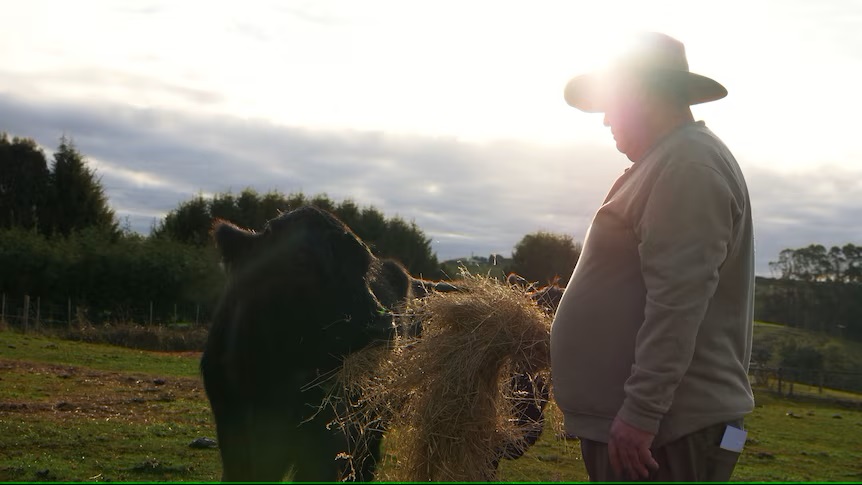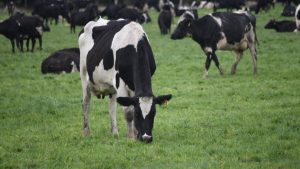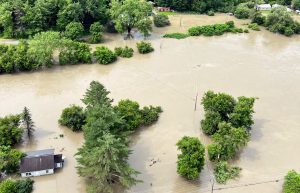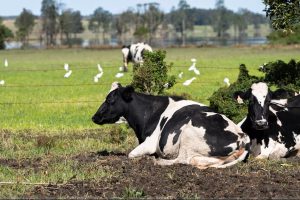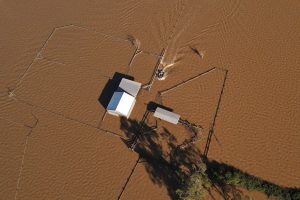
In short:
Farmers are struggling with one of the toughest dry spells on record in Tasmania.
Feed is scarce which has pushed prices up across the state, with some farmers are reporting prices upwards of $200 a bale.
What’s next?
Rural Alive and Well is urging farmers to seek mental health support, particularly as the challenging times are stretching across months.
When one of farmer Alan Kelley’s cows starting giving birth a couple of weeks ago, she grew so weak she couldn’t stand.
Mr Kelley shot her.
It has been one of the toughest dry spells on record in Tasmania, and some producers are down to their very last bales of feed.
“Well, that’s four left,” Mr Kelley said last week, standing in a paddock and pointing to a small pile of hay bales he cut from his 37-hectare property last season.
“That’s only got me another eight or 10 days.”
He has since run out of feed.
Alan Kelley says shooting his animals was a “difficult” decision, but one that he made to save them from suffering. (ABC News: Meg Powell)
Record low rainfall over spring, summer and autumn reduced the amount of hay Mr Kelley could cut by about a third, restricting his herd of about 40 breeding cattle to half rations.
For Mr Kelley, who is medically retired and living on a Centrelink Farm Household Allowance, cash is in short supply.
Scarcity of feed has pushed prices up across the state, with many farmers reporting prices upwards of $200 a bale.
This winter, Mr Kelley has lost calves and shot multiple cows because of a lack of feed. It’s a “difficult” decision he said he believed saved them from suffering.
“What are you going to do? Leave them there to starve for 24 hours before they die of exposure?” he said.
“They’re beautiful animals. Every farmer loves their animals … they’re like their babies. I don’t speak for all small farmers … but we’re all in the same boat. It’s bad out there.”
Record low rainfall over spring, summer and autumn reduced the amount of hay Alan Kelley could cut by about a third. (ABC News: Meg Powell)
When culling is easier than finding food
Mr Kelley’s situation is an extreme version of the challenges facing many farmers across the state, exacerbated by soaring feed costs, low sale prices for livestock and booked-out slaughterhouses.
TasFarmers president Ian Sauer said the situation was “serious” with some larger farms bleeding millions of dollars.
“Help is needed for many farmers. It’s feed — we need to be able to get feed,” he said.
Mr Sauer warned if spring did not bring rain, dire situations such as Mr Kelley’s could become more common.
“It’s now worse than it was a month ago,” he said.
“I can’t stress enough that when you’ve got cows and ewes pregnant or lactating, their feed demand goes up, and when there’s very little on the ground it becomes very hard.”
TasFarmers says if spring does not bring rain, dire situations like Mr Kelley’s could become more common. (ABC News: Meg Powell)
Animal welfare matter on King Island under investigation
Tasmania’s chief veterinary officer Kevin de Witte said while it wasn’t “normal” to cull animals, it could be the most humane choice “if you’ve run out of options”.
“It’s quite reasonable for a livestock owner to euthanise their stock if they’re concerned for their welfare and they can’t see a way forward,” Dr de Witte said.
He said culling itself was not a welfare infringement, but warned it could become one if not done “as per the recommended techniques”.
In Tasmania, that includes a close-range firearm or captive bolt to the brain, or chemical euthanasia under direct veterinary supervision.
Dr de Witte confirmed one matter on King Island was under welfare investigation.
Limited financial support available
Earlier this year, Mr Kelley secured a $2,500 donation from Rural Business Tasmania. He bought some grass seed and used his own money to buy fertiliser to spread it with.
But it didn’t rain, and the grass didn’t grow before winter hit.
Mr Kelley has since tried to apply for a federal loan but did not qualify because the mortgage on his property was not a commercial one.
He also earned far less than the $50,000 minimum in annual sales required for a one-off payment through the Tasmanian government’s Livestock Producers Seasonal Conditions Scheme.
Mr Kelley says every farmer loves their animals. (ABC News: Meg Powell)
Jen Robinson, general manager for agribusiness support network Sprout, said she had heard similar stories of other smaller producers missing out on grants because of their size.
“I don’t think [grants] are the silver bullet — because there isn’t one — but it would be really great to see those eligibility criteria broadened to ensure that that help can actually get to more people in all scales of farming,” she said.
A spokesperson for federal Agriculture, Fisheries and Forestry Minister Julie Collins said the federal government would work with the state government to continue supporting affected farmers.
Tasmania’s Primary Industries and Water Minister, Jane Howlett, said farmers who were unable to access the hardship grants could apply for up to $2,500 from Rural Business Tasmania.
Mr Kelley said both ministers were welcome to come and shoot his cows for him.
Lee Whiteley says while most farmers are used to dealing with short periods of high stress, it’s important to seek mental health support. (ABC News: Meg Powell)
Rural Alive and Well (RAW) chief executive officer Lee Whiteley said most farmers were used to dealing with short periods of high stress, but urged farmers to seek mental health support, particularly as the challenges dragged out over months.
“[RAW has] specific funding at the moment to put some additional resources on the ground to help those farmers where necessary,” Mr Whiteley said.
He said supports included face-to-face visits, and connecting farmers with other relevant services.
You can now read the most important #news on #eDairyNews #Whatsapp channels!!!
🇺🇸 eDairy News INGLÊS: https://whatsapp.com/channel/0029VaKsjzGDTkJyIN6hcP1K
